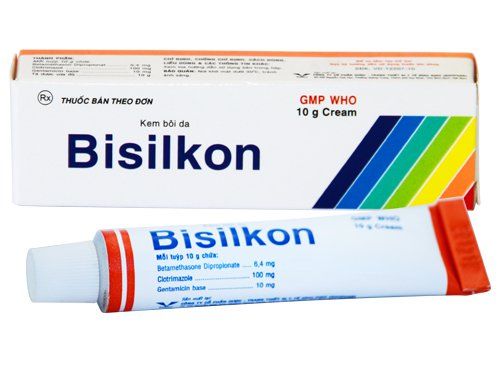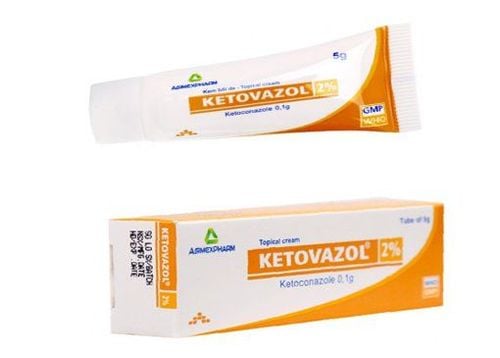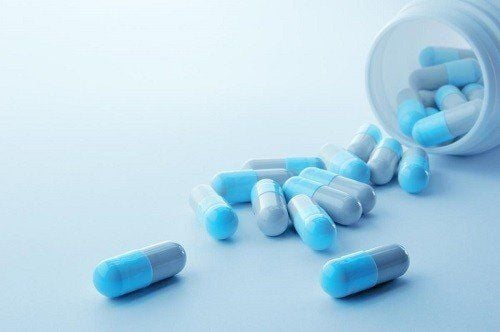This is an automatically translated article.
Sporal is made in the form of capsules, is an azole antifungal drug with the ingredient itraconazole. It is used to treat fungus and other conditions as prescribed by your doctor.
1. What does Sporal do?
The drug Sporal belongs to the group of antifungal, bacterial and viral drugs. The drug has the ability to destroy susceptible fungi by interfering with the formation of fungal cell membranes. This medicine is used to treat and prevent fungal infections of the skin and organs of the body.
Specifically, the drug Sporal is used to treat:
Ringworm; Candida in the mouth, throat, vulva and vagina; Tinea pedis, tinea pedis, inguinal skin, interstitial skin, fingernails, toenail fungus, pulmonary and extrapulmonary blastomyces, Histoplasma (including pulmonary disease and disseminated nonmeningococcal disease), Aspergillus pulmonary and extrapulmonary (in patients intolerant to amphotericin B); Maintenance treatment for HIV-infected patients, prevention of recurrent latent fungal infections; Prevention of fungal infections during prolonged neutropenia, ineffective conventional treatment regimens. Sporal is contraindicated for the following cases:
Hypersensitivity to itraconazole, other azoles or other ingredients in the drug; Concomitant use with lipid-lowering drugs, antiarrhythmic drugs, astemizol, terfenadine, oral triazolam, oral midazolam, cisapride,...; Treatment of nail fungus for women who are pregnant or planning to become pregnant.
2. Usage and dosage of Sporal
2.1 How to take The drug is taken orally, taking the whole tablet with a small amount of water. The patient should take the medicine exactly as directed by the doctor. Sporal should be taken immediately after a meal for maximum absorption. The duration of treatment and dose will be prescribed by the doctor depending on the type of fungus and the location of the infection.
2.2 Dosage Dosage in adults:
For short-term treatment, the dose of Sporal for adults is as follows:
Oral - Throat Candida: 100mg/day x 15 days. Patients with AIDS or neutropenia use the dose of Sporal 200mg / day x 15 days; Vulvar - vaginal candidiasis: Use dose 200mg/time x 2 times/day (1 day use) or dose 200mg/time/day (3 days use); Tinnitus: Use a dose of 200mg/time/this x 7 days; Tinea versicolor: Use dose of 100mg/time/day x 15 days. If fungal infection in highly keratinized areas, treat for an additional 15 days at a dose of 100mg/day. If long-term treatment (systemic fungal infection), the dosage is as follows:
Onychomycosis: Use dose 200mg/time/day, treatment for 3 months; Aspergillus: Use 200mg/time/day for 2-5 months. The dose can be increased to 200mg/time x 2 times/day if the disease is widespread; Candida: Use dose of 100-200mg/time/day, treatment for 3 weeks - 7 months. The dose may be increased to 200mg twice daily if the disease is widespread; Cryptococcal infections (not meningitis): 200mg/time/day for 6-12 months. Dosage in Children:
Efficacy and safety of Sporal in children have not been established. Dosages of 50mg/day (for children weighing less than 20kg) or 100mg/day (for children weighing 20kg or more) have been used in the treatment of tinea capitis.
Dosage for people with impaired liver and kidney function:
Should be cautious when using Sporal for these subjects.
*Note when using Sporal:
In case of systemic Candida infection suspected to be resistant to fluconazole, it may be less sensitive to itraconazole. Therefore, it is necessary to test for sensitivity to Sporal before treatment; Although short-term use of Sporal does not cause liver dysfunction, it should not be used in people with liver disease or liver toxicity caused by the use of other drugs. During long-term treatment (more than 30 days) with Sporal, it is necessary to periodically monitor liver function. Missed dose: If you miss a dose of Sporal, you should take it as soon as you remember. If it is almost time for the next dose, skip the missed dose and take the medicine on schedule.
Overdose: Some cases of patients taking drugs over 1,000mg have similar symptoms and side effects. Patients should be treated symptomatically and supportively, if necessary gastric lavage.
3. Side effects of the drug Sporal
Some side effects patients may experience when using Sporal drugs include:
Headache, dizziness, fever, weakness; Nausea, constipation, abdominal pain, digestive disorders; Hypertension, edema, chest pain; Menstrual disorders; Rhinitis, sinusitis or other upper respiratory tract infections; Allergic reactions: Itching, hives, angioedema; Stevens-Johnson syndrome, peripheral neuropathy; Blood count disorders, hypokalemia (when taking the drug for a long time); Increased liver enzymes, hepatitis (after long-term treatment).
4. Be careful when using Sporal
Some notes when using Sporal drugs include:
Sporal drugs are associated with congestive heart failure. Therefore, do not use Sporal in patients with congestive heart failure, history of congestive heart failure, risk factors,...; Use caution when administering Sporal to patients who are sensitive to other drugs of the Azole class; If neuropathy occurs possibly due to Sporal, the drug should be discontinued; Patients taking Sporal may experience temporary or permanent hearing loss. Hearing loss is reversible upon discontinuation of the drug or may persist in some patients; Do not use interchangeably between Sporal capsules and oral solution; Liver function should be monitored in patients receiving Sporal. If there are symptoms such as anorexia, nausea, vomiting, abdominal pain, fatigue, dark urine, ..., it is necessary to stop taking the drug and test liver function immediately; Absorption of itraconazole from Sporal is poor when gastric acid is reduced. Therefore, in people with reduced stomach acid, it is recommended to take Sporal with acidic drinks. At the same time, the antifungal effect should be monitored and the dose can be increased if necessary; Use Sporal with caution in children and the elderly; Sporal should be used with caution in patients with renal impairment, dose adjustment may be required; In some immunocompromised patients, the oral bioavailability of Sporal may be reduced; Sporal is not recommended for the initial treatment of patients with life-threatening systemic fungal infections; Consider the maintenance treatment of systemic antifungal Sporal in patients with AIDS; Use caution when using Sporal in people with cystic fibrosis; Note when using Sporal drug in drivers, operating machines because the drug can cause some adverse reactions such as dizziness, hearing loss, visual disturbances,...; There have been no studies on the drug Sporal on pregnant women, so it should only be used when absolutely necessary; Sporal does pass into breast milk, so it's important to weigh the benefits and risks before giving it to a nursing mother.
5. Drug interactions
Possible drug interactions when using Sporal with the following drugs:
Antiarrhythmic drugs: The itraconazole component in Sporal may increase the concentration of quinidine, dofetilide when used concurrently, causing multiple effects. unpredictable side effects on the heart, can cause cardiac disorders, threaten the patient's life; Blood cholesterol-lowering drugs: Including atorvastatin, lovastatin, simvastatin, pravastatin,... Itraconazole can increase blood levels of these drugs, increasing their effects and risk of toxicity; Antiretrovirals: Itraconazole increases the concentration of maraviroc; Benzodiazepines : Including midazolam, triazolam, diazepam,... Itraconazole can increase the concentration or prolong the sleep-inducing and sedative effects of these drugs; Terfenadine, cisapride, astemizol: Concomitant use of itraconazole with these drugs is contraindicated because itraconazole increases serum concentrations of these drugs and decreases drug clearance; Warfarin: Itraconazole enhances the anticoagulant effect of warfarin; Felodipine, Nifedipine, Verapamil (calcium blocker): Itraconazole can inhibit, metabolize these drugs, can cause heart spasms and add to the effect of itraconazole; Antacids, H2 antagonists (ranitidine, cimetidine) or sucralfate, omeprazole: Combined with Sporal reduces the bioavailability of itraconazole, losing its antifungal effect; Rifampicin, phenobarbital, isoniazid, phenytoin: Combined with the drug Sporal reduces plasma concentrations of itraconazole. Sporal is used to control and treat fungal infections. When using the drug, the patient should pay attention to the possible side effects to report to the doctor for timely advice and support.
Please dial HOTLINE for more information or register for an appointment HERE. Download MyVinmec app to make appointments faster and to manage your bookings easily.













